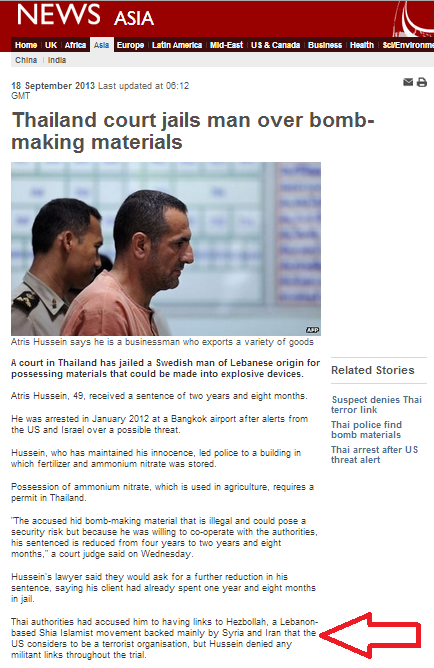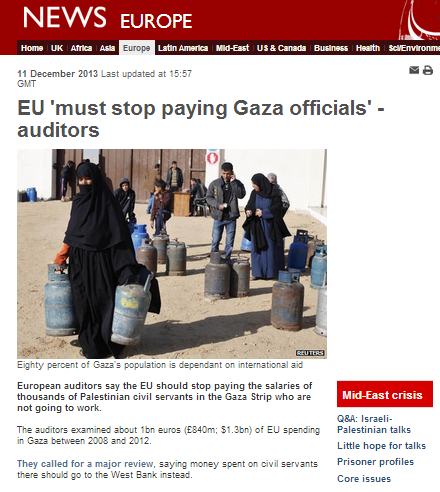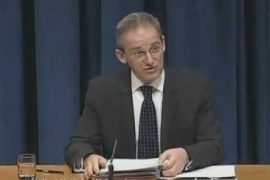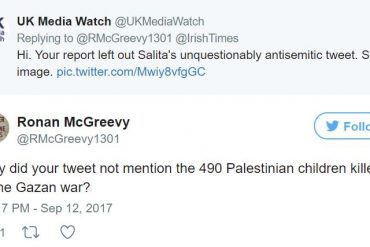On the evening of March 25th the Board of Deputies of British Jews and the JLC put out an unprecedented letter criticising the leader of the British Labour Party and calling for a protest outside Parliament the following day.
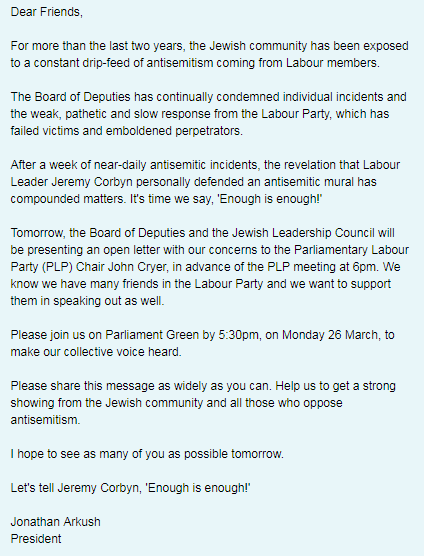
The BBC News website reported that story on its UK page on March 26th in an article titled “Jewish groups attack Jeremy Corbyn over anti-Semitism“.
“”Enough is enough,” Jewish groups have said in a letter accusing Jeremy Corbyn of failing to tackle anti-Semitism. […]
The letter – drawn up by the Board of Deputies of British Jews and the Jewish Leadership Council – said there has been a “repeated institutional failure” to properly address anti-Semitism.
It accuses Mr Corbyn of being unable to “seriously contemplate anti-Semitism, because he is so ideologically fixed within a far left worldview that is instinctively hostile to mainstream Jewish communities”.
The organisations refer to Mr Corbyn’s apparently supportive message to the creator of an allegedly anti-Semitic mural in 2012 and his attendance at “pro-Hezbollah rallies”.” [emphasis added]
That last paragraph includes a link to a BBC report from March 23rd headlined “Jeremy Corbyn regrets comments about ‘anti-Semitic’ mural” in which readers are also told that the mural was “allegedly anti-Semitic”.
“Jeremy Corbyn has expressed “sincere regret” at failing to look more closely at an allegedly anti-Semitic mural in London before questioning its removal.”
Readers are also offered another item of related reading dating from the previous day titled “Tom Watson apologises over ‘anti-Semitic’ mural row“.
“Labour’s deputy leader Tom Watson says Jeremy Corbyn was right to express regret for sending an apparently supportive message to the creator of an allegedly anti-Semitic mural.”
Clearly the question of whether or not that 2012 mural included antisemitic imagery is crucial to audience understanding of this story. Obviously too, the BBC is very reluctant to provide an answer to that question.
In addition to the repeated use of the word ‘allegedly’ and punctuation implying that the question is open to interpretation, all three of those BBC reports state that the artist “has denied being anti-Semitic”. At the same time opposite views of the topic from both Watson and Corbyn are quoted.
“He [Corbyn] added: “I sincerely regret that I did not look more closely at the image I was commenting on, the contents of which are deeply disturbing and anti-Semitic.”
“My reaction is that is a horrible anti-Semitic mural that was rightly taken down,” he [Watson] said.”
The Jewish Chronicle’s Stephen Pollard notes that:
“The work, Freedom for Humanity, was painted near Brick Lane in London’s East End by “graffiti artist” Kalen Ockerman, who goes by the name of Mear One.
Its intent was obvious. It showed businessmen and bankers sitting counting their money. Not only did they look like obvious caricatures of Jews – in a style reminiscent of Nazi propaganda in the 1930s – the artist himself confirmed they were intended as such, writing: “Some of the older white Jewish folk in the local community had an issue with me portraying their beloved #Rothschild or #Warburg etc as the demons they are.”
Anyone with even a basic knowledge of politics, history and the world would see that the work was caricaturing Jews. And, to be blunt, anyone denying that is indulging in sophistry of the most pathetically unconvincing kind.
Indeed, the then Mayor of Tower Hamlets, Lutfar Rahman, himself ordered council officials to “do everything possible” to remove the mural, agreeing that “the images of the bankers perpetuate anti-Semitic propaganda about conspiratorial Jewish domination of financial institutions.”
To repeat: this was not a controversial view. The artist himself held it, publicly.”
This is of course far from the first time that the BBC has refrained from unambiguously informing its audiences that content at the centre of a controversy is antisemitic.
However, with concerns about antisemitism within the second largest party in the UK parliament now prompting the mainstream British Jewish community to take such an action for the first time in decades, it is obviously essential that Britain’s national broadcaster be capable of providing its audiences with a clear and accurate view of the story.
And that necessarily includes being able to unambiguously describe antisemitism as such – without the equivocal punctuation and qualifying terminology all too frequently seen in BBC content.
Related Articles:
Déjà vu in BBC News coverage of UK MP’s Facebook posts story
BBC discovers that MP’s “Israel” Facebook posts were antisemitic
More promotion of the Livingstone Formulation from BBC News
BBC News tries – and fails – to explain antisemitism and anti-Zionism
The BBC and “a politer version” of antisemitic conspiracy theory
BBC Radio 4’s ‘Today’ and ‘alleged’ antisemitic Tweets

